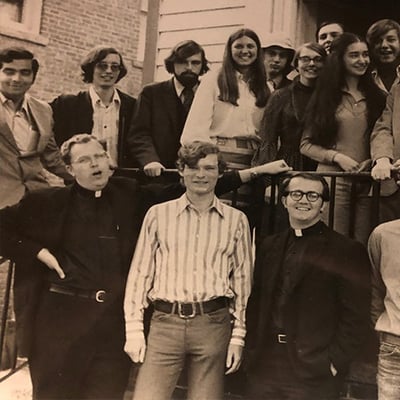 The Saint Thomas More community was a pivotal Christian environment for me and so many others during my four years at Yale college, which began in the fall of 1971. Father Richard Russell was the chaplain during that time, and he was very hospitable to anyone who arrived at the chapel. One evening he invited a group of us to his kitchen to show us how to make spaghetti a la carbonara, a recipe he acquired while studying theology in Rome. Another evening, we had Mass in his living room during which the farewell discourses (Chapter 17) were read from John's gospel. We experienced genuine Christian fellowship and joy, the beauty of faith, the richness of scripture and Catholic spirituality. It was like walking for the first time into a fragrant garden which somehow many of us had never noticed before. Father Russell offered wise advice for those of us who had suddenly become fervent Catholics: find ways to connect with people at Yale in their everyday lives, find common ground in conversation, and strive to be relatable so that we might share our personal faith experience without alienating people. Advice that has endured.
The Saint Thomas More community was a pivotal Christian environment for me and so many others during my four years at Yale college, which began in the fall of 1971. Father Richard Russell was the chaplain during that time, and he was very hospitable to anyone who arrived at the chapel. One evening he invited a group of us to his kitchen to show us how to make spaghetti a la carbonara, a recipe he acquired while studying theology in Rome. Another evening, we had Mass in his living room during which the farewell discourses (Chapter 17) were read from John's gospel. We experienced genuine Christian fellowship and joy, the beauty of faith, the richness of scripture and Catholic spirituality. It was like walking for the first time into a fragrant garden which somehow many of us had never noticed before. Father Russell offered wise advice for those of us who had suddenly become fervent Catholics: find ways to connect with people at Yale in their everyday lives, find common ground in conversation, and strive to be relatable so that we might share our personal faith experience without alienating people. Advice that has endured.
It was an exciting adventure being counter-cultural at Yale, engaging in conversations in the dining rooms about the meaning of life, posing the question to skeptics as well as ourselves: "But what if all this is true, and not an illusion, what then?" Because of the pervasive and powerful secularism of the Yale culture, we wrestled with-- both intellectually and personally-- how to make the Christian faith our own. We believed it. We gave our best youthful energies to live it. And we became good friends with our fellow non-Catholic Christians at the campus Inter-varsity Fellowship as we held so much in common.
During my freshman year, the Chapel offered a retreat entitled "Confessions of a True Believer" which took place at a home along the rocky Connecticut coast. A very engaging student shared her discovery that the essence of Christianity is having a personal relationship with Jesus Christ. This profoundly shaped my life, my goals, my decisions.
While at Yale, I was asked to direct three dramatic presentations at the Chapel for penance services-- the Selfish Giant, the Jonah story and the story of the Prodigal Son. We also arranged two psalms for liturgical dance, Psalm 51, the Miserere for Lent and Psalm 104, the Pentecost creation psalm.
Downstairs in the basement of the chapel once a week there was a charismatic prayer meeting which included participants from the New Haven area, as well as graduate and undergraduate students and Yale professors. It was a joyful oasis of song and worship. Even though more than forty years have gone by, I will never forget one of the inspirational talks given at that prayer meeting about "the pearl of great price." We were awakening to the reality that Jesus is the pearl worth surrendering everything else for.
Such special memories-- too many to cite here. During this tumultuous period the Vietnam War was coming to a close and there was much societal upheaval. I remember meeting Dorothy Day in her humble granny sneakers, speaking at a parish on Dixwell Avenue about Christian poverty and her unique approach to social action.
I will also never forget the Jesuit priest, Father Wayne Fehr, who used to say daily Mass at the Chapel from time to time. He generally concluded each of his homilies, regardless of the subject, with the words ". . . and this is why we must always give our lives to God." And this is what we tried to do at Saint Thomas More Chapel.



